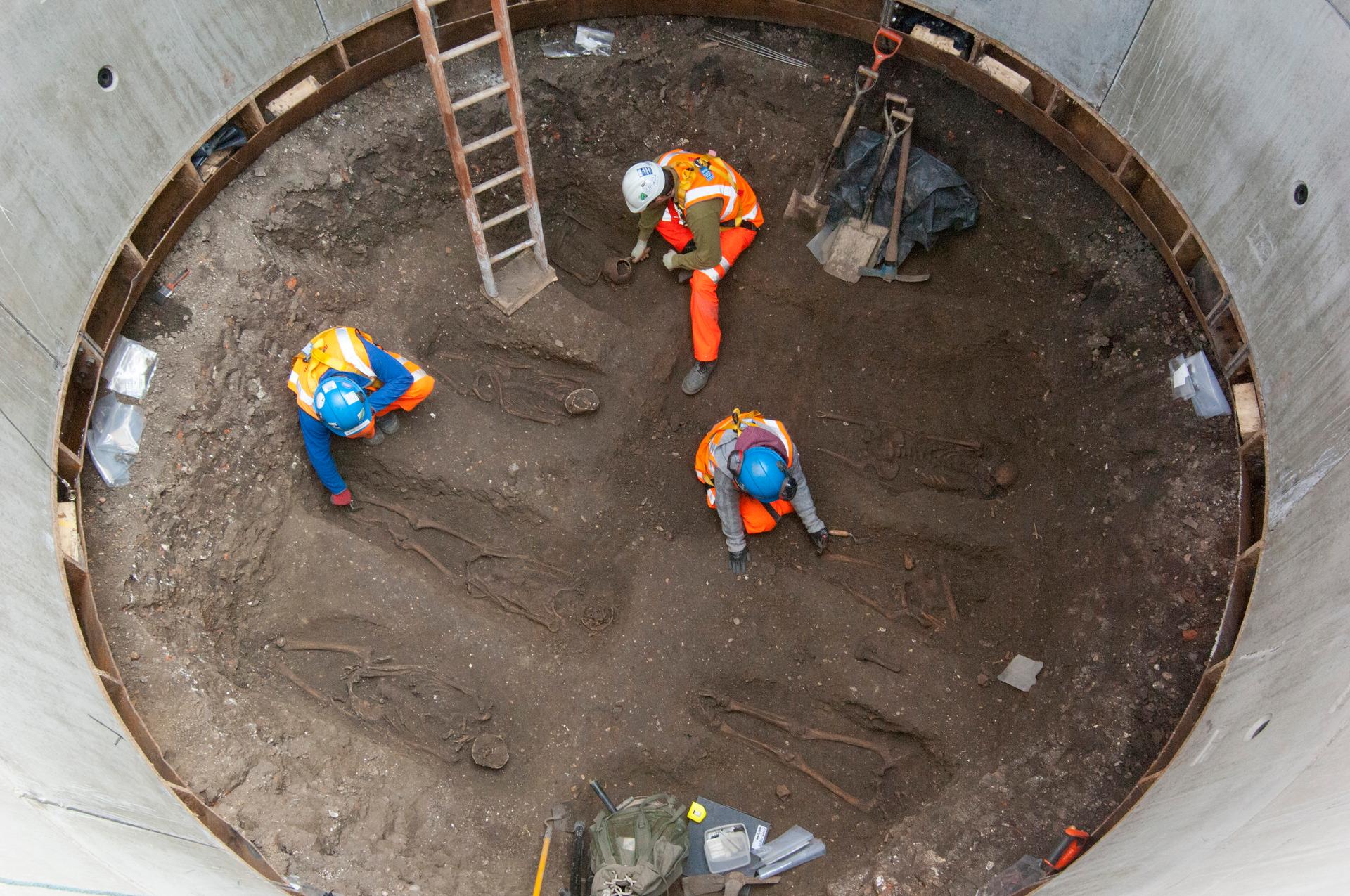Found: One London cemetery where thousands were believed buried after dying of the plague
Archaeologists work on unearthed skeletons in the Farringdon area of London in this undated handout photograph released March 15, 2013. Archaeologists said on Friday they had found a graveyard during excavations for a rail project in London which might hold the remains of some 50,000 people killed by the “Black Death” plague more than 650 years ago.
In a city like London, you don’t have to dig deep to come across some fairly grisly history. Archaelogists have uncovered a morbid reminder of plague that swept through the city more than six centuries ago, in 1348.
In the process of excavating for London's new Crossrail station, workers encountered a number of skeletons, wrapped in shrouds and laying neatly next to each other. Experts now believe it's a cemetery that was the final resting place for at least 50,000 people — one that had been lost for hundreds of years.
Reuters has a report on how scientists have confirmed their finding and what this may mean for science today.
(Editor's note: The Global Scan can be delivered straight to your inbox every weekday. Just register and sign up today.)
That's not science — that's lunch
The UN's International Court of Justice has ruled that the Japanese government must halt its whaling program in the waters off Antarctica. The court in its ruling agreed with Australia, which brought a case in May 2010, arguing the Japanese program was not for scientific research as claimed by Tokyo and therefore could not be exempt from a 1994 ban on whaling near Antarctica. Japanese officials said they would abide by the ruling but were disappointed by it. PRI's The World has the story.
The curse of optimism? Obama's Putin delusion explored
The New York Review of Books’ Amy Knight argues that the current White House is handicapped by a chronic psychological delusion: the curse of ‘misguided optimism’ in relation to Vladimir Putin. Knight argues that while the West says it was completely caught off-guard by Putin's decision to invade Crimea, it shouldn't have been. Ever since coming to power in 2000, Putin has worked to roll back US influence in former Soviet states and re-establish Russian influence. And this is just the latest example.
The question remains, will Putin stop where he is, or keep pushing for more of Ukraine or even Moldova's Transnistria region. And perhaps more importantly, is there a new school of thought in the US that will be ready for whichever way the Russian leader may be leaning.
This mother-to-be's major focus is keeping her child from getting HIV
Nolubabalo Zwane lives in Cape Town, South Africa, with AIDS. She's pregnant — and determined she won't pass the illness onto her baby. She's on antiretroviral medication that greatly diminishes the odds of her child becoming sick and will also help her remain healthy as well. Zwane is fortunate, she knows that this protocol usually works. She used the same regimen when she was pregnant with her first child, who was birn HIV-negative. PRI's The World has a moving video of the mother, the latest installment of our special series The Ninth Month.
Turkey's local elections are about more than who is mayor
The results of local elections in Istanbul this past weekend matter more than you might think, argues Kaya Genç in the London Review of Books. As a city on the boundary between Europe and Asia, the city is literally and figuratively at a crossroads. As became increasingly clear during the Gezi Park protests 10 months ago, Turkey is debating whether to modernize or hang onto the city's history. Will it create a Manhattan-style skyline in the heart of the city? Will a park be plowed under? Many of those projects will be advanced, or rejected, by the mayor of Istanbul.
So, whether the city has peace or more protests may be tied directly to these elections. Genç argues, if the election were held just a few months from now, rather than over the weekend, the results would have been quite different.
What we're seeing on social
Weather around the world
Hong Kong was battered over the weekend with a thunderstorm that dropped some serious hailstones and intense rain. The South China Morning Post has pictures of golfball-sized hailstones and submerged vehicles after the major storm battered the city.
